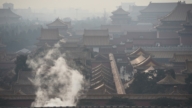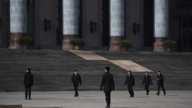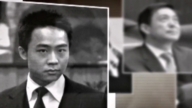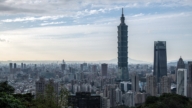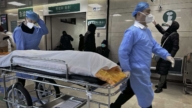【新唐人2013年03月18日訊】中共為何不崩潰?很多觀察家曾反覆指出,中國正面臨嚴峻的社會、政治緊張局勢、和日益擴張的貧富不均,以及腐敗。跟那些被顛覆的阿拉伯國家並無兩樣。然而,所謂的「中國之春」,終究沒有像大多數人所預期的發生。那麼,「中國之春」何時來?大陸學者對此作出各種分析。
「中央民族大學」哲學和宗教學系教授趙士林指出,中國社會確實存在很多嚴重問題。貧富懸殊,特權氾濫,經濟節奏,包括社會、經濟、政治,方方面面。但是中國老百姓沒有爆發顛覆性革命,跟過去三十年的經濟迅速發展,成為世界第二大經濟體有很大關係。
中央民族大學哲學和宗教學系教授趙士林:「中國還是一個幅員遼闊,發展極不平衡的國家。經濟發展的巨大成果當然在分配方面有嚴重問題。但是中國人畢竟也在改革開放獲得了巨大收益。」
前國務院農村發展研究中心、中共中央農村政策研究室研究員姚監復也認同,經濟因素起到重要作用。
前國務院農村發展研究中心研究員姚監復:「GDP很高的時候,他的分配即使不均勻,但是最低收入的人跟十年前比,跟三十年前比,還是提高了。所以是相對貧困化,不是絕對貧困化。這樣的話,老百姓能忍受。人們一說,比以前好了,老百姓能忍受。」
趙士林指出,中國沒有發生革命,跟中國人吃苦、忍耐的民族性,以及共產黨這個嚴厲的國家機器也有關係。
趙士林:「中國人你知道是非常能吃苦的,也是非常能忍受的,只要是有口飯吃,他一般是不會造反的。另外,你也知道中國(共)政府的執政能力,中國(共)的國家機器也是空前強大,他會不惜代價,也要維護國家穩定。」
另外,姚監復認為,中國人的強烈民族主義情感,也是「茉莉花革命」在中國沒有發生的原因之一。
姚監復:「所以幾百年中國受了列強的壓迫。特別是日本,特別是八國聯軍,老百姓有一個強烈的民族自尊心。所以只要你國家強了,老百姓覺得我也可以忍受一點,承受一點。現在習近平用了民族復興這個口號,能凝聚民心。」
美國「橋港大學」助理教授赫斯在《外交家》雜誌撰文說,中國發生的抗議多數針對局部性問題,於局部性區域發生,如基層官員腐敗或徵地事務等,除1989年震撼人心的「六四」事件,抗議者並沒有將活動發展成全國範圍的意願,也少有針對中央政府的傾向。
趙士林:「中國的整體比如政治體制問題,改革問題,關注的人當然還是大有人在。比如知識份子群體,更多的關注這個問題。他們也經常就中國的整體問題,中國的大政方針問題,中國的改革問題不斷的提出意見。通過網絡、通過其他形式。」
姚監復也指出,如果經濟劇烈下滑,社會矛盾進一步激化,中國就可能出現大規模動盪。
姚監復:「經濟下滑,大量失業。兩億農民工大部分失業。四千萬農民工已經成了失地農民,回農村也沒有地的話,這時候中國會出現混亂。而這個混亂就可能引發政治社會的巨大矛盾。因此現在講發展是硬道理,是逼不得已。整個執政的合法性基礎,就建立在經濟高速發展、GDP的增長上。」
《經濟學人》3月16號評論說,在中國知識份子圈子裡,正流行閱讀託維爾的《舊制度與大革命》,一本講述「1856年法國大革命」的書。這本書跟中國現狀最有共鳴的是,舊制度在革命中倒下不是因為他們抵制變革,而是他們試圖改革卻打破了他們的期待。如果託維爾說的是對的,那麼習近平將面臨一個無解的困境,那就是:為了生存,共產黨需要改革;但是改革本身可能成為最大的危險。
採訪編輯/秦雪 後製/葛雷
CCP’Regime Yet to Crash: When Will"China Spring"Come?
Why has the Chinese Communist Party’s (CCP) regime
not collapsed yet, many people keep asking themselves.
A lot of China affairs observers repeatedly talked about
China’s severe social problems, intense political situation, growing rich-poor gap, and ubiquitous corruption.
All these differ little from the circumstances
in the Arabian regimes when they were overturned.
Yet, “China Spring"has not arrived yet,
despite being longed for and awaited by many.
When will the “China Spring” break out?
Mainland scholars share their opinions on the topic.
Zhao Shilin, professor at China’s Minzu University,
remarked, China has indeed some serious problems.
Like the wealth inequality, rampant privilege,
and other social, economic, and political issues.
However, the Chinese people have not tried to overturn
the CCP regime through revolution.
This has a lot to do with the economic development
in the past 30 years, during which China has become the second largest economy in the world.
Zhao Shilin: “China is still a huge country
with extremely imbalanced development.
It is true that there are some severe problems
in distributing the fruits of economic development.
But after all the Chinese people have benefited
a lot from the economic reform."
Yao Jianfu, former researcher at the CCP central rural policy
research office, also agrees that the economic factor plays a key role in this issue.
Yao Jianfu: “Even with an imbalanced distribution,
the overall GDP level is much higher,
the incomes of the poorest people have still improved
compared to that of 10 or 30 years ago.
Therefore the pauperization is only a relative one,
not an absolute one.
In such a case the ordinary people can still tolerate,
by telling themselves that the life is better than before."
Zhao Shilin added, China has not seen any revolution yet,
also due to Chinese having a tradition of bearing hardships.
In addition, the CCP has a very strict system
of controlling the nation.
Zhao Shilin: “You know that the Chinese can bear hardships,
and they are capable of enduring a lot.
As long as they have something to eat
they won’t easily revolt.
Moreover, the CCP is famous for its “ruling" capability.
It has an unprecedented powerful bureaucracy,
and it has the determination to maintain the “stability"
of its regime at any cost."
Yao Jianfu further remarked that Chinese people
generally have a strong sentiment of patriotism,
which is another reason
why the Arab Spring has not taken place in China.
Yao Jianfu: “In the late hundreds years, China has been
oppressed by powers, like Japan and Eight-Nation Alliance.
Therefore the Chinese people have
a strong national pride’sentiment.
They are willing to tolerate to some extent,
provided that the country becomes stronger as a whole.
Currently, Xi Jinping throws out the slogan of national
rejuvenation to bid for more support by the people."
Steve Hess, an assistant professor at University
of Bridgeport, wrote an article for the magazine Diplomat.
He remarked that most China’s mass protests are restricted
in a local area, and are directed against local issues such as corruption or expropriation by local officials.
Except the striking “June 4 Incident"in 1989, very few
protesters attempted to extend activities nationwide,
or were inclined to direct them
against the central government.
Zhao Shilin: “Of course there are many caring about China’s
issues as a whole, such as the political reform.
For example, the group of intellectuals
cares more about this.
They frequently put forward opinions about China’s issues
as a whole or overall policies, either on the Internet or using other means."
Yao Jianfu believes that if the economy declines sharply
and the social conflicts become more intense, it is possible to see larger-scale turbulence in China.
Yao Jianfu: “An economic downturn will lead
to a massive unemployment.
If most of the 200 million migrant workers lose their jobs,
40 million of them will become farmers without a land,
because they have no land to work on,
even if they go back home in the countryside.
In such a case China may slide into anarchy, which can then
lead to huge conflicts in politics and the Chinese society.
Therefore now the CCP believes in
“Development is of overriding importance."
The regime’s legitimacy lies
in the rapid economic development and the GDP."
The Economist wrote on Mar 16,
“There is a vogue in Chinese intellectual circles
for reading Alexis de Tocqueville’s 1856 book on the
French Revolution, ‘The Old Regime and the Revolution’.
The argument that most resonates in China is that old
regimes fall to revolutions not when they resist change,
but when they attempt reform
yet dash the raised expectations they have evoked.
If de Tocqueville was right, Mr Xi faces an impossible
dilemma: to survive, the party needs to reform; but reform itself may be the biggest danger."



